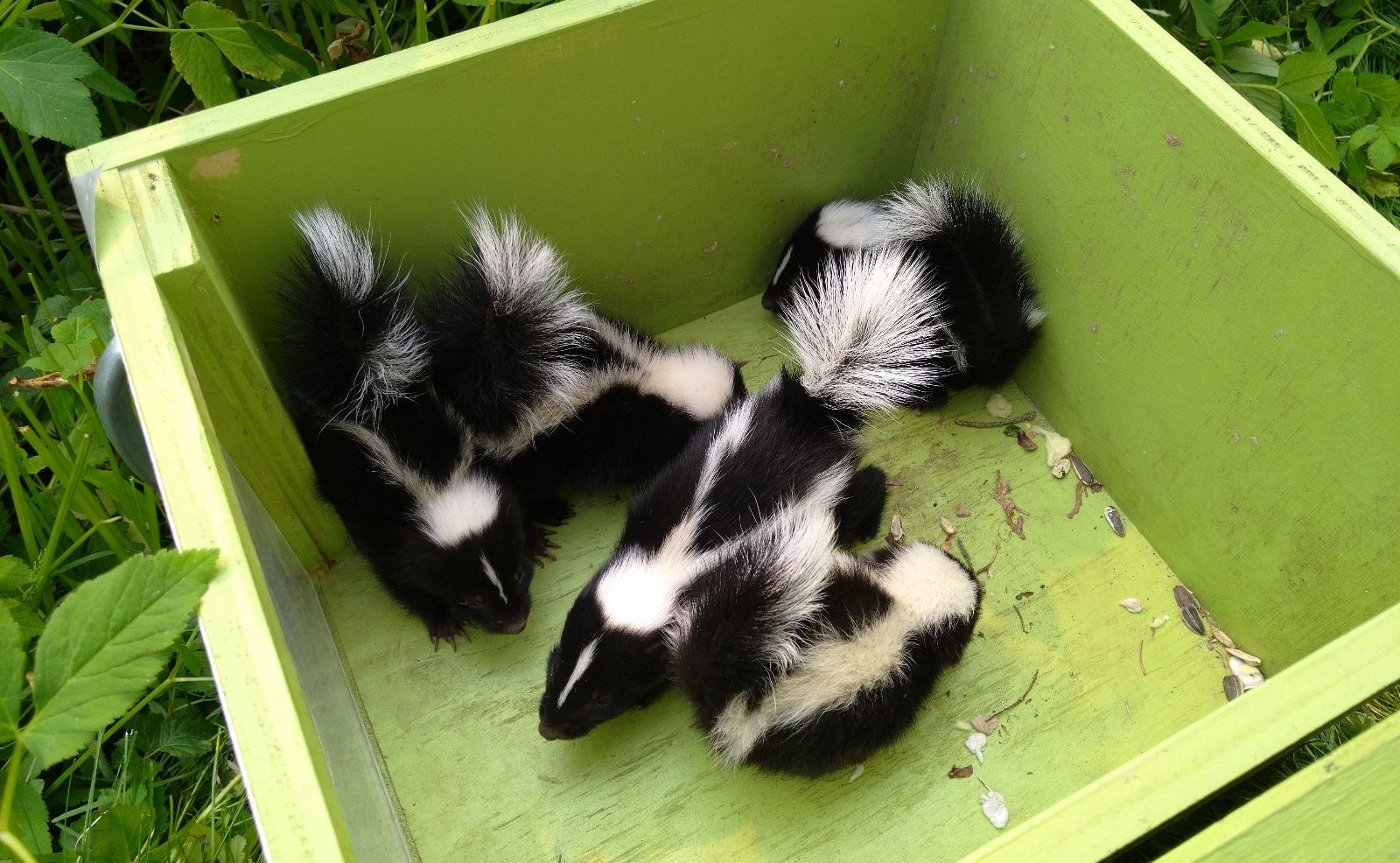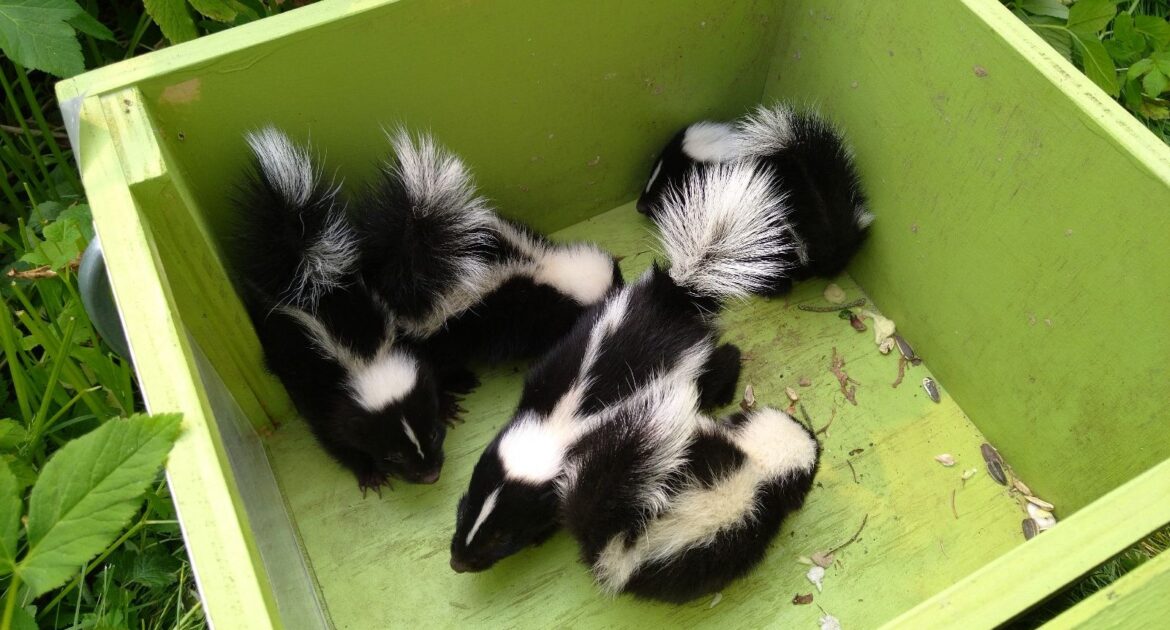Skunks, with their distinctive black and white coloring, are among the most recognizable wildlife in North America. While they play an important role in the ecosystem, controlling insect and rodent populations, they also pose significant challenges for homeowners. These challenges go beyond their notorious spray—a potent defense mechanism that can be difficult to remove from skin, clothing, and pets. They can also carry diseases harmful to humans and pets, such as rabies, distemper, and leptospirosis, not to mention the potential damage they can do to gardens, lawns, and structures when they dig for food or make their dens. In Anoka County, encounters with skunks are not uncommon, leading many to seek effective wildlife removal services to manage these animals.
Understanding the behavior of skunks and knowing how to coexist with them safely is key for homeowners. This includes securing trash, using motion-activated lights to deter them at night, and ensuring there are no accessible areas under decks or sheds for skunks to den. However, when encounters become too frequent or pose a direct threat to your household, professional wildlife removal in Anoka County becomes essential. Skedaddle Humane Wildlife Control can safely and humanely remove skunks from your property, mitigating the risk of confrontation and ensuring a peaceful coexistence between humans and wildlife.
Understanding Skunk Behavior
Skunks are intriguing animals whose behaviors and habits, when comprehended, can aid in managing encounters with them more efficiently. These animals are primarily nocturnal, actively seeking food during the night. Their diet is diverse, encompassing insects, grubs, small rodents, fruits, nuts, and human refuse, which often draws them to human properties. They are attracted not with the intent of causing disturbance but in search of food or a suitable habitat.
To deter these animals from your property, it is advisable to adopt preventive measures. Ensuring trash cans are securely sealed can prevent them from accessing food. Removing pet food dishes at night and clearing any fallen fruits or nuts from gardens can also reduce their attraction to your property. Furthermore, they dig to forage and establish dens for shelter and reproduction. Blocking off access points under decks or sheds with rocks or fencing can discourage them from nesting.
Understanding skunk behavior allows for the development of strategies to peacefully coexist with them. The goal is to make your property less appealing to them without causing them harm, recognizing their natural behaviors and habitat needs.
Handling a Close Encounter
Handling a close encounter with a skunk requires calm and measured actions to avoid startling the animal, which may lead to it spraying as a defense mechanism. Here are steps to follow if you find yourself close to a skunk:
- Stay Calm and Still: They spray when they feel threatened. If you encounter one, remain calm and avoid sudden movements that could startle it.
- Slowly Back Away: Gradually move away. Do this slowly and quietly, keeping your eyes on the skunk but avoiding direct eye contact, which could be perceived as a threat.
- Protect Pets: Keep pets on a leash and close to you. If pets confront a skunk, they are more likely to get sprayed.
- Use a Light: If the encounter occurs at night, gently shine a light on the animal. This can sometimes make it feel less secure and encourage it to leave. However, be cautious not to startle it with sudden or bright lights.
- Do Not Corner: Ensure the skunk has an escape route. They are more likely to spray if they feel trapped or cornered.
- Avoid Sudden Movements: Movements such as running, waving your arms, or shouting can provoke the animal into spraying.
- Never Attempt to Feed: Feeding a skunk can encourage it to remain in the area and lose its natural fear of humans, leading to more encounters.
By understanding and respecting the natural behaviors of skunks, humans can minimize the likelihood of being sprayed and promote coexistence with these often misunderstood creatures.
How To Prevent Skunk Encounters
To effectively prevent encounters on your property, it’s crucial to understand and implement strategies that make your area less appealing to these creatures. One of the most effective ways is by managing waste properly. They are attracted to garbage as a food source, so ensuring your bins are tightly sealed and garbage is disposed of promptly can significantly reduce their interest in your property.
Another preventive measure involves securing your outdoor living spaces. They seek shelter in places like under decks, sheds, and porches. By using sturdy materials to block access to these potential dens, you make it harder for skunks to settle down. Consider installing a mesh fence that goes a few inches into the ground around these structures to keep them out.
Lighting up your yard can also deter these animals, which are nocturnal by nature. Motion-activated lights serve as an excellent deterrent, making them uncomfortable and less likely to remain in well-lit areas. This approach can be particularly effective since skunks generally avoid active human presence.
You might wonder, “Do skunks come out in the day?” It’s rare, as they are mainly active at dawn and dusk. However, seeing one during the day might indicate it’s in search of food or it could be a mother foraging. To minimize the chances of daytime encounters, keep your yard clean of food sources, such as pet food bowls, accessible compost bins, and fallen fruit from trees.
Lastly, maintaining your lawns and gardens can help prevent visits. Skunks dig up lawns in search of grubs and insects. By keeping your garden tidy and treating your lawn for pests, you reduce the food sources available, making your property less inviting.
By following these tips, you can significantly reduce the chances of encountering a skunk on your property, fostering a peaceful coexistence with these creatures from a safe distance.
How Skedaddle Handles Skunk Infestations
At Skedaddle Humane Wildlife Control, we understand that peaceful coexistence with wildlife is paramount. That’s why we specialize in humane, non-intrusive methods to prevent encounters on your property. Our approach is comprehensive, focusing not only on the immediate removal of skunks but also on the long-term prevention of future visits.
Firstly, we conduct a thorough property assessment to identify potential attractants and vulnerabilities. We look for food sources like accessible trash, pet food, or gardens that might be inviting to skunks. Once identified, we provide tailored solutions to make your property less appealing, such as securing garbage bins and suggesting changes to landscaping that deter skunks.
In addition to removing attractants, we focus on fortifying your property against skunks. We expertly secure potential entry points under decks, sheds, and crawl spaces with durable materials designed to keep them out without harming them. This preventive barrier method ensures that they cannot establish dens on your property, addressing the root cause of the problem rather than just the symptoms.
By hiring Skedaddle, you’re choosing a team committed to humane and ethical wildlife control. We understand the importance of each creature in our ecosystem and work towards solutions that respect wildlife while keeping your property safe and skunk-free. Our methods are designed to ensure the safety and well-being of both humans and animals, making Skedaddle the responsible choice for managing wildlife encounters.
Achieve Harmony With Skunks
Living alongside wildlife, including the often misunderstood skunk, requires a blend of knowledge, patience, and proactive measures. While this guide has provided practical steps to prevent and manage encounters, it’s equally fascinating to consider how skunks communicate with each other, offering insight into their complex behaviors beyond just their notorious defense mechanism.
By taking preventive measures such as securing trash and modifying our landscapes, we can significantly reduce the likelihood of unwelcome visits. If you’re facing persistent skunk presence, remember that humane, professional help is just a call away. Skedaddle specializes in humane wildlife removal in Anoka County, providing effective solutions that respect wildlife and your peace of mind.
Take action today by ensuring your property is less attractive to skunks, and if the situation persists, don’t hesitate to reach out to professionals. By working together, we can achieve a harmonious balance with the skunks in our communities.




